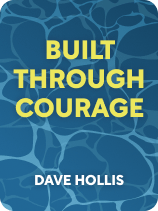

This article is an excerpt from the Shortform book guide to "Built Through Courage" by Dave Hollis. Shortform has the world's best summaries and analyses of books you should be reading.
Like this article? Sign up for a free trial here.
Do you feel like you’re doing nothing with your life? How can you identify your unique purpose? What steps can you take to achieve that purpose?
Built Through Courage by Dave Hollis is a motivational guide for those living an unfulfilled life. All you need to turn your life around is a purpose you strive to achieve.
Read below for a brief overview of Built Through Courage to get the main ideas.
Built Through Courage by Dave Hollis
Do you ever feel stuck—like you’re just going through the motions instead of doing something really meaningful? Have you recently experienced upheaval in your life, and you don’t know what to do now? In Built Through Courage, Dave Hollis offers a solution to these common problems. According to Hollis, the key to living a happy and fulfilled life is achieving your unique purpose—a specific role you’re meant to fill.
Dave Hollis (1975-2023) worked as a Disney executive for 17 years before changing careers to become a motivational speaker, CEO, and self-help author. While Hollis’s position at Disney is considered a dream job by many, he felt trapped and unfulfilled because he wasn’t living according to his ideals and goals—he wasn’t achieving his purpose. Recognizing his purpose motivated him to change careers and helped him find happiness and fulfillment despite major life upheavals, including a divorce. Hollis hoped his book could help other people achieve their purposes and find happiness and fulfillment too.
What Is Purpose?
Purpose is a driving force that motivates and inspires you, guiding you throughout your life. Hollis explains that every person has specific talents and unique experiences. These talents and experiences are gifts, and every person has a responsibility to share their gifts with others: This is your purpose.
Hollis says his purpose comes from God, who created him to fulfill a specific role and gave him the talents and experiences necessary to achieve this purpose. However, he stresses that religious or spiritual beliefs aren’t necessary to accept this idea of purpose. It doesn’t matter where your purpose comes from, so long as you recognize that you have one and strive to achieve it.
In this section, we’ll discuss why achieving your purpose is important and how to identify your purpose.
Achieving Purpose Increases Happiness
It’s important to recognize and work toward your purpose because doing so is the key to a happy and fulfilled life, Hollis says. When you recognize your purpose, the desire to achieve it can motivate you to change your life in positive ways—for example, leaving an unfulfilling job—which in turn increases your happiness and fulfillment.
In addition, recognizing your purpose can give you a stronger sense of self, which Hollis says is especially valuable in times of change or adversity. People attach their sense of identity to the roles that they play, such as their job title and marital status. This is dangerous, though, because these roles can change—you can switch jobs, get married, or get divorced. When this happens, you can lose your sense of identity, which makes it much harder to adapt to your new situation.
For example, Hollis says he felt lost when going through his divorce because he’d based so much of his identity on being a husband. After identifying his purpose, he realized that his identity was based more on being kind and helping others rather than being a husband or Disney executive.
To avoid this loss of identity, Hollis says to attach your sense of identity to parts of yourself that don’t change. He includes some roles such as father and brother among these immutable elements of self, implying that these roles are a biological truth and can’t change, regardless of external circumstances. He also includes his role as a child of God and his desire to do his best every day on the list, implying that faith and intentions can be an important part of identity.
Identifying Purpose
Everyone has a unique purpose based on their individual talents and experiences, as discussed above. However, it’s likely that you could apply your talents and experiences in multiple ways, making it difficult to determine how best to share your gifts with the world. Hollis recommends looking at the intersection of five components to discover the best way to achieve your purpose and live a happy and fulfilling life:
Ideals: Pursue your purpose in a way that aligns with the traits and behaviors you value. Hollis suggests identifying your ideals by considering how you want others to describe you and what makes you feel good about yourself. For example, imagine your purpose is to be a film director. Your ideals might include creativity, passion, and spreading happiness.
Enthusiasm: Pursue your purpose in a way that excites and interests you. Hollis suggests identifying what you’re enthusiastic about by considering what you love doing outside of your responsibilities. For example, you might love telling stories to your friends, and you might apply that to your purpose by telling stories through film.
Proficiency: Pursue your purpose in a way that lets you use your skills. Hollis suggests focusing on the skills you’re most proud of and confident in. For example, you might be talented at working collaboratively and directing camera angles, which you can easily apply to your directing.
Positive effect: Pursue your purpose in a way that benefits the world. Hollis specifically suggests considering how your skills can fill a need. For example, as a director, you could tell stories that provide hope and encouragement to marginalized and disenfranchised people.
Financial stability: Pursue your purpose in a way that supports you financially. For example, as a director, you might achieve financial stability by making popular movies.
How to Achieve Your Purpose | Step #1: Understand Your Current Circumstances
To fulfill your purpose, you must first understand your current circumstances, Hollis says. Since your previous actions weren’t helping you achieve your purpose, you’ll have to change certain aspects of your life and behavior to better fit this goal. To make these changes, you must first understand what you’re changing, how you arrived at your current circumstances, and why you don’t want to remain in that state.
To understand your current circumstances, determine whether your environment supports or harms your efforts to achieve your purpose. This includes aspects of life like the people you surround yourself with and the media you consume.
Step #2: Believe You Can Change Your Circumstances
As discussed, many people don’t fulfill their purpose because they don’t recognize their own potential for change. Thus, an important step to changing your life and fulfilling your purpose is believing you can do so.
Hollis offers a few tips for cultivating the belief that you can change your circumstances:
Tip #1: Use Imagination
Imagination is an important tool for believing change is possible. It lets you picture different opportunities and paths forward rather than simply accepting your current path. In turn, realizing you can make those potential lives a reality encourages you to change.
For instance, Hollis had the opportunity to leave Disney and help his then-wife run her self-help and lifestyle company—a change that aligned well with his purpose of helping others and his goal to be more present for his family. After working at Disney for so many years, though, he struggled to even consider this new path. It seemed illogical to leave a well-paying, respected job that guaranteed a steady future. However, by letting himself imagine what his life would look like if he left, Hollis realized how much happier and more fulfilling that alternative path would be. That encouraged him to depart Disney to pursue his purpose.
To start this process, imagine dying without any regrets, Hollis says. What would your life look like? What would you have done? Imagining the happiness and fulfillment of a life without regrets provides a big-picture idea of how you want to live and gives you the courage to make changes in the present so you can realize your imagined scenario.
Tip #2: Challenge Restrictive Beliefs
Challenging your restrictive beliefs is another important part of believing that change is possible. Restrictive beliefs are negative things you believe about yourself that stop you from changing or achieving your purpose. They usually stem from your upbringing, the roles that affect your sense of identity, and your past experiences. These are the main elements that influence your behavior and sense of self, Hollis says, which in turn affect your decisions.
For example, if you were frequently left in charge of your younger siblings growing up, you might develop the restrictive belief that you have to be responsible for other people and that your role is the “caretaker.” This belief stops you from pursuing your own interests and goals since you’re focused on looking after others. If you want to achieve your purpose and feel happy and fulfilled, you must challenge your restrictive belief and give yourself permission to focus on yourself instead of (or in addition to) focusing on other people.
To overcome your restrictive beliefs, analyze where they came from, Hollis suggests. Often, these beliefs stem from untrustworthy sources—people who don’t understand or support your values and goals and instead try to impose their own values and goals on you. Recognizing that these sources are untrustworthy makes it easier to dismiss restrictive beliefs.
For example, you may have the restrictive belief that becoming a teacher is a boring, low-status, poorly paid career path. If you analyze the source of this belief, you can realize that it stems from your parents, who value high-paying, competitive business careers. This doesn’t align with your own ideals of pursuing your passion, helping others, and sharing knowledge, making your parents an untrustworthy source.
Tip #3: Change Your Perspective
Changing your perspective can also help you believe that you can change your life and achieve your purpose. Hollis says your experiences shape you: The type of significance you put on an experience affects your behavior and sense of self. If you put positive significance on experiences—viewing them as a source of strength or motivation, for instance—you’re more likely to grow as a person and achieve your purpose. This is in contrast to putting negative significance on experiences—for example, viewing them as a source of weakness or pain—which defines you by those events and makes it difficult to move past them.
To focus on the positives of past situations, consider how they helped you grow, rather than focusing on how they hurt you, Hollis says. This shift in focus can help you feel empowered to grow and change, instead of trapped by your experiences.
For example, if you get fired from a job and focus on feeling angry, embarrassed, and inadequate, you’ll keep feeling those emotions every time you think about working, which will discourage you from applying to other jobs. If you instead focus on the lessons you learned—for example, you’re not suited to an office job—you’ll feel empowered to use that knowledge to find a job that suits you better, allowing you to move on from losing the first job.
Step #3: Change Your Circumstances
Once you understand your current circumstances and believe that change is possible, the next step is to actually change—to take actions that help you achieve your purpose. Hollis points out, however, that you can only have one priority at a time. If you focus on one specific goal, you’re more likely to achieve that goal than if you split your attention among several. This will help ensure that all your actions are focused solely on achieving your purpose.
There are two main barriers to focusing on your purpose and changing your circumstances to achieve it: fear and expectations.
Barrier #1: Fear
Fear is the biggest barrier to changing your circumstances, Hollis says. Fear paralyzes you, preventing you from fulfilling your purpose. This happens because humans have a natural tendency to imagine and fixate on the worst possible future scenarios, which traps you in your fear. For instance, Hollis experienced this when going through his divorce. He was so afraid of losing his family and his sense of identity as a husband that he struggled to prepare himself for single life.
Barrier #2: Expectations
The second major barrier to changing your circumstances to achieve your purpose is the expectations people have for you, Hollis says. You’re so focused on fulfilling expectations others have put on you that you can’t work to achieve your purpose.
Expectations trap you in fear, Hollis adds. You’re afraid to disappoint others by dismissing their advice or living in a way they don’t approve of. Thus, you prioritize these expectations above your own desires and purpose, leading you to feel unhappy and unfulfilled. The expectations become a restrictive belief: You feel that you can’t fulfill your purpose because you must fulfill what others expect of you instead.
Overcome expectations by challenging your restrictive beliefs surrounding them and committing to living according to your values rather than others’. Analyzing the source of your beliefs, as we discussed in Step 2, can help you recognize when other people’s expectations are unfair, unhealthy, and negatively influencing your behavior. You can then overcome these beliefs to refocus on living in a way that makes you happy, aligns with your goals and values, and drives you toward your purpose.

———End of Preview———
Like what you just read? Read the rest of the world's best book summary and analysis of Dave Hollis's "Built Through Courage" at Shortform.
Here's what you'll find in our full Built Through Courage summary:
- Why the key to a fulfilled life is achieving your unique purpose
- How to identify and achieve the role you're meant to fill
- How to overcome the two barriers to reaching your potential






